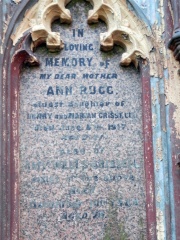Thomas De La Garde Grissell







Thomas De La Garde Grissell (c1778-1847)
1801 Married Ann Eleanor Peto
1801 Birth of son Thomas Grissell (1801–1874)
1803 Birth of son James Grissell (1803–1864)
1805 Birth of son Charles Grissell (1805–1857)
1808 Birth of daughter Mary Grissell (1808–1842)
1809 Birth of daughter Hannah Grissell (1809–1888)
1813 Birth of daughter Elizabeth Grissell (1813– ). Married 1850 to John Hedges Marshall of Wallingford.[1]
1815 Birth of son Henry Grissell (1815–1816)
1817 Birth of son Henry Grissell (1817–1905)
1820 Birth of son Martin De La Garde Grissell (1820–1904)
1847 July 28th. Ann died. 'On Wednesday, July 28th, at Stockwell Common, Surrey, Ann, the beloved and revered wife of Thomas la Garde Grissell, Esq., and sister to the late Henry Peto, Esq.[2]
1847 October 28th. Thomas died. 'On the 28th ult., suddenly, at his house, Stockwell Common, deeply lamented, in his 70th year, Thos. la Garde Grissell, Esq., late of the East India House; having survived his beloved wife only three months.'[3]
1849 Legal dispute over estate. '...The circumstances of the case were these. A gentleman named Henry Peto by his will bequeathed two fifths of his residuary estate to Thomas Delagarde Grissell, and Ann his wife, and amongst such of their children as should be living at the death of Ann. It was considered by the family that this gift, which made the interest of each child contingent upon its surviving the mother, was objectionable, and consequently in April 1832 a deed was prepared having for its object to substitute for the children of Ann any child or children they might leave should any such children of Ann die in the lifetime of the mother. Thomas Delagarde Grissell, and Ann his wife, and their eight children, were parties to the deed. It appeared, however, that some of the children were absent, others infants, and one child, James, refused to execute the deed. One of the eight children of Thomas Grissell and Ann died in the lifetime of the mother, leaving four children, the present plaintiffs, who now claimed to be entitled to their mother's share by virtue of the deed. It was contended on the other side, that as several of the parties had never executed the deed they were not bound, and that unless all of the children were bound the deed was not binding upon any...'[4]

